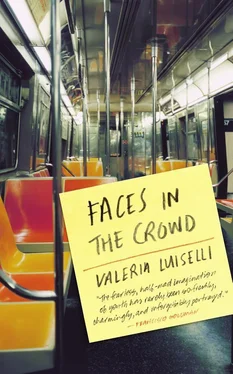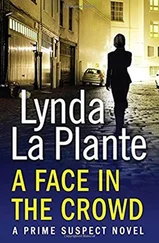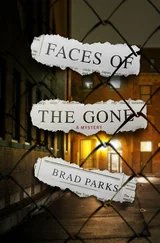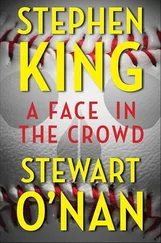*
I walked very little in that city where everyone goes for walks. I went from my apartment to the office, from the office to some library. And, of course, to the cemetery a few blocks from my house. One day, in her eternal eagerness to bring about a change in me, my sister Laura sent me an e-mail from Philadelphia. It said simply: 115 West 95th Street. Laura lived in Philadelphia with her wife, Enea. They still live there. They’re active people, pleased with themselves. Enea is Argentinian and teaches at Princeton. Laura and Enea belong to all sorts of groups and organizations; they’re academics; they’re left-wing; they’re vegetarians. This year they’re going to climb Kilimanjaro.
I left my apartment, bundled up in my gray tights and the red coat with enormous pockets. I coiled a scarf around my neck and walked directly to the address Laura had sent me.
The location existed, but it was the number of an imaginary house. Instead of doors, windows, and steps, there was a brick wall on which someone had painted a window frame, a vase of flowers, a cat snoozing on the sill, a woman looking out into the street. Too late, I realized it was one of Laura’s sophisticated jokes. A trompe l’oeil that functioned as a trope for my lifestyle in that city. I don’t know what Laura would say now that my only walks are from the kitchen to the living room, from the upstairs bathroom to the children’s bedroom. But Laura knows nothing of this, nor will she be told.
On the way back to my apartment, I stopped at a rummage sale outside a church. I bought a 1950s anthology of modern American and British poetry for one dollar and a small bookcase with four shelves for ten. I used to like walking along the streets carrying furniture. It’s something I don’t do anymore. But when I did, I felt like a person with a purpose. Back in my apartment, I put the bookcase in the center of the only wall in the living room without windows and placed my new book on the top shelf. From time to time I’d open the book, choose one of the poems, and copy it out. When I left the house to go to the office, I took the sheet of paper with me to memorize the poem. William Carlos Williams, Joshua Zvorsky, Emily Dickinson, and Charles Olson. I had a theory; I’m not sure if it was my own but it worked for me. Public spaces, such as streets and subway stations, became inhabitable as I assigned them some value and imprinted an experience on them. If I recited a snatch of Paterson every time I walked along a certain avenue, eventually that avenue would sound like William Carlos Williams. The entrance to the subway at 116th Street was Emily Dickinson’s:
Presentiment is that long shadow on the lawn
Indicative that suns go down;
The notice to the startled grass
That darkness is about to pass.
*
Milk, diaper, vomiting and regurgitation, cough, snot, and abundant dribble. The cycles now are short, repetitive, and imperative. It’s impossible to try to write. The baby looks at me from her high chair: sometimes with resentment, sometimes with admiration. Maybe with love, if we are indeed able to love at that age. She produces sounds that will have a hard time adapting themselves to Spanish, when she learns to speak it. Closed vowels, guttural opinions. She speaks a bit like the characters in a Lars von Trier movie.
*
I write: I met Moby on the subway. And though that is the truth, it’s not really credible, because normal people, like Moby and I, never meet on the subway. Instead, I could write: I met Moby on a park bench. A park bench is any park, any bench. And that, perhaps, is a good thing. Perhaps it’s right that words contain nothing, or almost nothing. That their content is, at the very least, variable. Typically, the bench would be green and made of wood. So, not to be predictable, I should write: Moby was reading a newspaper on one of the white, slightly battered concrete benches in Morningside Park. A bent, submissive gardener was trimming the hedge with a pair of clippers. It was 10 a.m. and the park was almost empty, like the word park and the word bench . Maybe I ought to explain why I was crossing the park from east to west at ten in the morning. I’d lie: I was going to mass. I was going to the cemetery, or the supermarket, which perhaps are more or less the same thing. Or better: I’d spent the night sleeping on one of those benches.
But what’s the use of all that if the truth is: I met Moby on the subway. I was reading some book whose title I can’t now remember— A orillas del Hudson by Martín Luis Guzmán, perhaps — and he was next to me, turning the pages of a fascinating book with stills from films by Jonas Mekas. I asked him where he’d found the book and he told me he’d produced it himself. He handed me a card for a printer, his printer, in a town outside the city.
*
It was very easy to disappear. Very easy to put on a red coat, switch off all the lights, go somewhere else, not go back to sleep anywhere. No one was waiting for me in any bed. They are now.
Now I know that when I go into the children’s room, the baby will catch my smell and shiver in her crib, because some secret place in her body is teaching her to demand her part of what belongs to us both, the threads that sustain and separate us.
Then, when I go into my own room, my husband will also demand his portion of me and I will give myself up to the indefinite, sudden, serene pleasure of his touch.
*
Moby had a big nineteenth-century house in a town that was soulless, but pleasant in its puritan way, not far from the city. The house didn’t have electricity or running water. Moby lived there, lived alone. He heated up cans of soup on a kerosene stove and slept on a mattress on the floor. His bedside book was the biography of Santayana. He got up at five every day, made a cup of green tea, and worked at the printing press until after midday. He lived that way of his own volition, not because there were no other options. There are two types of people: those who just live and those who design their lives. Moby was in the latter category. You had to take off your shoes before entering his house and put on Japanese slippers. There was something affected in that life, in the over-aestheticization of that reality, designed as if to be viewed through a lens. I definitely did not fit into Moby’s filmic life. That’s why I accepted the green tea, why I let Moby undress me, wrap me in a Japanese robe, and then undress me again in order to run his bony hands, his narrow nose, his thin, almost invisible lips over my body. That’s why I slept naked on that mattress next to the printing press, and hurried away the following morning. I was in the habit of carrying around two sets of keys to my apartment — one in my bag and the other in the pocket of my red coat in case I lost one — and, before going, I left a set for Moby, on top of a note with my address.
*
The baby’s asleep. The boy, my husband, and I sit on the stairs, facing the front door. He asks his father:
Papa, what’s a wasp?
It’s a dangerous bee.
And a sperm whale?
It’s a Moby-Dick.
*
One night I acquired a writing desk for my empty apartment. I didn’t buy it. But I didn’t steal it either. I suppose I should say that it was found for me. I was in a smoker’s bar. I’d spent the evening rolling cigarettes, browsing through a terribly boring anthology of Mexican poets — friends of Octavio Paz and, perhaps for that reason alone, translated into English — while waiting for Dakota to finish her last set in a nearby bar. When my mind momentarily wandered from my reading, I had the sensation that someone was watching me from outside. Through the window, I saw Dakota on the sidewalk, sitting on something, straightening her stockings. She waved and beckoned me over. I paid. Dakota was sitting on an antique writing desk, her dainty red high-heeled shoes beside her.
Читать дальше











